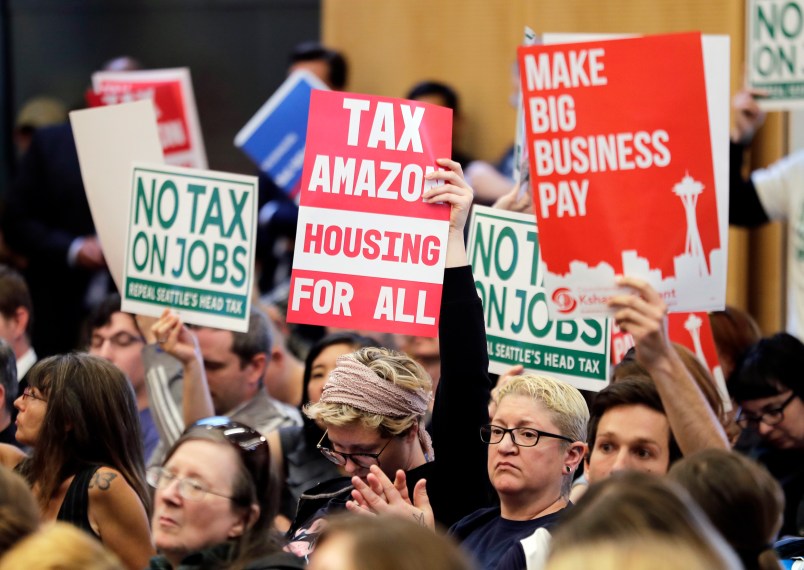SEATTLE (AP) — Seattle leaders on Tuesday repealed a tax on large companies such as Amazon and Starbucks after a backlash from businesses, a stark reversal from a month ago when the City Council unanimously approved the effort to combat a growing homelessness crisis.
The council voted 7-2 after supporters and opponents packed a meeting with signs saying, “Tax Amazon, housing for all” and “No tax on jobs,” with some shouting for more time to discuss the issue.
The vote showed Amazon’s ability to aggressively push back on government taxes, especially in its affluent hometown where it’s the largest employer and where some have criticized it for helping cultivate a widening income gap that is pricing lower-income workers out of housing.
The tax was proposed as a progressive revenue source aimed at tackling one of the nation’s highest homelessness numbers, a problem that hasn’t eased even as city spending on the issue grew.
Businesses and residents demanded more accountability in how Seattle funds homelessness and housing and said it should take a regional approach to the problem. Many worried that Amazon and others would leave the city, with construction workers in hard hats and safety packing City Hall to object to the tax.
Amazon, Starbucks and others sharply criticized the tax as misguided, and the online retailer even temporarily halted construction planning on a new high-rise building near its Seattle headquarters in protest.
Supporters praised it as a step toward building badly needed affordable housing. They said too many people are suffering on the streets and that the problem is deepening, despite city-funded programs finding homes for 3,400 people last year.
Seattle spent $68 million on homelessness last year and plans to spend even more this year, not counting the tax that would have raised roughly $48 million annually.
But a one-night count in January found more than 12,000 homeless people in the Seattle and surrounding region, a 4 percent increase from the previous year. The region saw 169 homeless deaths last year.
In the end, city leaders underestimated the frustration and anger from residents, businesses and others over not just a tax increase but also a growing sense that the problem appears to have gotten worse, not better, despite the city already spending millions to combat homelessness.
Several council members, including three who sponsored the legislation, lamented the about-face even as they supported repealing the tax.
“I am deeply troubled and disappointed by the political tactics utilized by a powerful faction of corporations that seem to prioritize corporations over people,” Councilwoman Lorena Gonzalez said Monday.
She added that the consequences will be felt profoundly by the thousands of people without shelter or stable housing.
Jeff Shulman, an associate professor in the University of Washington’s Foster School of Business, said the way the tax got pushed through is the antithesis of the collaborative spirit the city is known for.
“It kind of set up larger businesses as the enemy, and in reality, the city is going to need them as allies and partners,” he said.
Seattle’s tax would have charged companies about $275 per full-time worker each year for affordable housing and homeless services. It targeted nearly 600 businesses making at least $20 million in gross revenue and would have taken effect next year.
Days after the measure passed, a coalition of businesses called the No Tax On Jobs campaign began gathering signatures to get a referendum overturning the tax on the November ballot.
Tax supporters faced the prospect of having to fight the campaign that easily raised more than $280,000 in cash contributions in just weeks.
“They’ve made clear they have the resources to bankroll many more months of nastiness,” the group Working Washington said in a statement.
Mayor Jenny Durkan and a majority of the city council acknowledged facing “a prolonged, expensive political fight over the next five months that will do nothing to tackle our urgent housing and homelessness crisis.”
John Kelly, senior vice president of public affairs for Starbucks, said repealing the tax makes sense.
“The best path forward is to implement the reforms recommended two years ago by the city’s own homelessness expert,” he said in a statement Monday.
It marks the latest Amazon effort against taxes at all levels of government.
The company recently said it would block Australians from purchases on its international websites after the nation planned to impose a 10 percent consumption tax on online retailers for goods shipped to Australia.
The tax debate comes as 20 cities vie to lure the company’s second headquarters and as it expands its workforce in Boston and Vancouver, British Columbia.
Cities have offered lavish tax breaks and incentives to lure the company and its promise of adding tens of thousands of high-paying jobs. Critics have said it is wrong for profitable company to push for public money, especially considering the added costs to infrastructure and services the new headquarters would bring.



